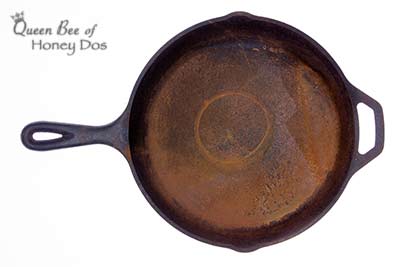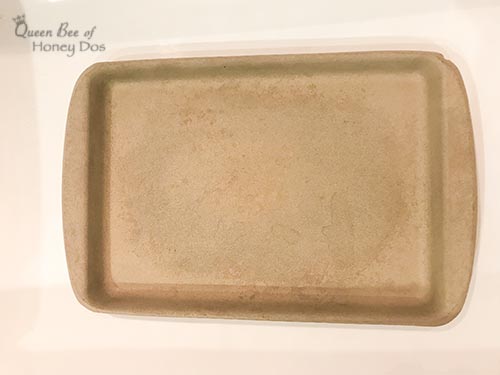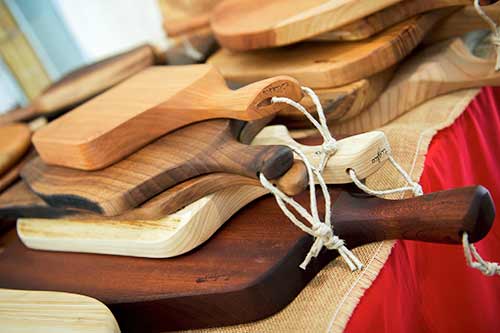A dishwasher is an amazing tool to have in the kitchen, but when used incorrectly it can destroy some of your most prized pieces. These 23 items are things you should never wash in a dishwasher!
For the most part, anything that can go in a dishwasher will have a “dishwasher safe” stamp on the bottom. However, there are so many things that are perfectly safe to go in a dishwasher that does not have that stamp.
There are also a lot of unsafe items that do have that “dishwasher safe” stamp. All of this can get confusing. But the first step is to look for that stamp. In addition, I highly recommend that you avoid placing the following items inside your dishwasher, regardless.
Cast Iron Cookware

Dishwashers will remove all of your hard-earned seasonings. In addition, cast iron can and will develop flash rusting.
Related article you may be interested in reading:
How to Remove Rust from Anything!
Stoneware

Just like cast iron, stoneware owners spend months, even years, developing a nice layer of seasoning. One round in a dishwasher will ruin that.
Even if you have not built-up a layer of seasoning on your stoneware, a dishwasher will cause detergent to penetrate the stone and impart a nasty flavor into your food.
Related article you may be interested in reading:
See what happened when my stoneware was placed in the dishwasher and how I go about restoring my Pampered Chef stones.
Nonstick Cookware
While there is no immediate issue with using a dishwasher to clean nonstick cookware, over time, it can breakdown the coating. To extend the lifespan on these you should always hand wash them.
Sensitive Metals
Many metals are sensitive to the chemicals used in dishwasher detergents and will suffer from discoloration and/or pitting. Among these are aluminum, copper, brass, and pewter.
Natural Stone
Natural stone such as items made from marble or slate is easily etched when washed incorrectly. Dishwasher detergent is much too strong for these items. Use plain soap and water for cleaning.
Wood

Nothing made of wood should ever be washed in a dishwasher. This includes cutting boards, spoons, and wooden bowls. Long term exposure, as well as the heat and pressure from a dishwasher, can cause wood to expand, dry out, and crack.
Always hand wash wood items with the least amount of water necessary to get the item clean. Adding an occasional treatment of mineral oil to the item is also a good idea and will help protect and preserve the piece.
Related articles you may be interested in reading:
How to Clean a Knife Block the proper way.
Guide to Cutting Boards and Butcher Block Tops (i.e. finding your perfect fit)
How to Make a Cutting Board
DIY Custom Knife and Cutting Board Drawer
Cutlery
The sharp edge of a knife can be easily damaged from items banging into them in a dishwasher. However, the real damage comes to knives in the form of pit corrosion.
Most knives are made from either stainless steel coated, carbon, or carbon-coated in stainless steel. Carbon is what makes a knife hard and is very common in higher-end pieces.
However, this also makes them susceptible to humidity and acid erosion, both of which can easily happen when a knife is allowed to stay wet with water and/or acidic chemicals.
All types of knives can develop rust spots if mistreated. To avoid damage to your cutlery, always hand wash and dry immediately after every use. And if you notice a rust spot beginning to form, remove it immediately.
Fine China
Fine china made prior to 1979 should never be washed in a dishwasher. Supposedly, you can wash newer sets in the dishwasher on the delicate setting. But why chance it?
These sets are usually on the expensive side. Since broken dishes caused by a dishwasher is not an unheard-of phenomenon, hand washing may be the safest option.
Hand Painted, Gold Plated or Printed
Dishwashers can fade or remove surface accents in these items. Items such as vintage Pyrex, dishes ringed in gold, commemorative plates, and custom cups/mugs fall into this category.
If the dish has a decorative finish that you wish to keep, you should avoid placing them in the dishwasher.
Insulated Mugs and Cups
Insulated mugs, such as Yeti mugs, have a sealed layer between the exposed surface and the insulation layer. Dishwashers can damage this seal.
In addition, some mugs may have the “dishwasher safe” stamp on the bottom but may have been altered by secondary manufactures in ways that cancel out that protection. For example, epoxy coated mugs should not be placed in a dishwasher even if the mug is stamped as safe.
Fragile Glassware
Fragile glasses and stemware can easily be broken in a dishwasher. Some glass, especially older glass and hand-blown glass, can suffer from pitting.
Crystal Items
Crystal stemware, vases, and serving platers can crack in high heat. Even with the low heat or delicate setting, crystal can suffer from scratches and dulling from detergents.
Unsafe Plastics

Plastic can warp and even melt in a dishwasher. Most of us throw cheap plastic lids and bowls in the dishwasher without a thought for their safety. Because these are usually considered disposable, you may be ok with taking the chance.
But if you want to preserve those plastic items, always avoid placing non-dishwasher safe plastics in the dishwasher. If you must, always use the top rack to keep the piece far away from the heating element.
Geers and Gaskets
If it has a gear or a gasket, it likely should not go in the dishwasher. All of those hidden components can retain water and detergent chemicals which can result in damage.
Some things that fall into this category are instant pot lids, pressure cooker lids, mixer components, blender components, and grinders.
Antiques and Family Heirlooms
If it means a lot to you or it is very valuable, a dishwasher may not be the safest option. Prized pieces should be handled with care.
Milk Glass
Dishwashers can discolor milk glass. It often results in yellow-tinged glass that looks old and dated.
Other Unsafe Household Items
The list of items that people try to wash in a dishwasher is long and often perplexing. Some of the most common items that should not go in the dishwasher include remote controls, toothbrushes, sponges, keyboards, bras, greasy car/machine parts, paintbrushes, and food items.
Yes, people actually put these things in their dishwasher. But all of these present their own problems.

- Remotes can be ruined by water and detergent that seeps onto the electric board.
- Keyboard components can be damaged by water that gets into and is left behind in hidden grooves. Heat can also damage sensitive parts beneath the keys.
- Toothbrushes and sponges should not be cleaned with dishwasher detergent and/or rinsing aids. They won’t get cleaned and properly sanitized, and toothbrushes can be damaged by the high heat.
- Bras are delicate and can be damaged by the harsh chemical makeup of dishwasher detergent, and since you shouldn’t put laundry detergent in your dishwasher, it is probably best to find a different cleaning method for these.
- Greasy car and/or machine parts can clog your filter and drain lines.
- Paintbrushes can be damaged in a dishwasher and if oil-based products were used, they can release toxic chemicals into your machine. These oils can leave behind a film that coats all surfaces and is not easily removed.
- Food such as potatoes and fish are the most common items that people think are safe in the dishwasher. People typically believe that as long as they are just using water without detergent, this is safe. However, detergents and rinse aids can linger in your machine for many cycles and be deposited onto your food items. If you think that is gross, take a look at your filter sometime. All that dirty water and gunk that is hiding down there is recycled back into the machine during the wash.
Related Posts You May Be Interested In:
How To Clean a Dishwasher
How to Clean Stainless Steel to remove smudges, streaks, and watermarks.

I could go on and on, but I think this is a good stopping point. However, please feel free to add to the list by leaving a comment below!
Please keep it clean. Comments that do not follow the Comment's Policy may be removed.